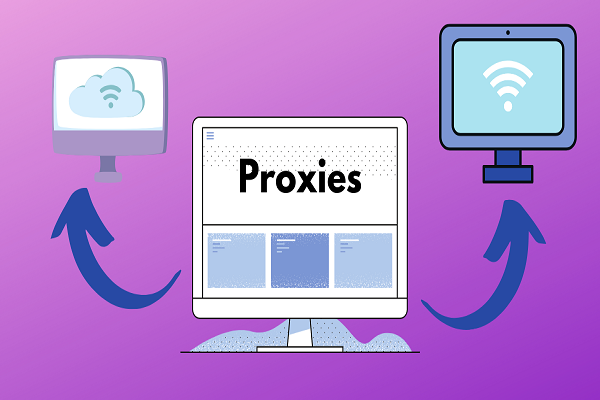Internet proxies are intermediary servers that mask our identity online. In the last two decades, the revelations about privacy violations on the web have shaken the world, and the inhumane treatment of internet users has led to an increase in the popularity of privacy tools, with proxy servers spearheading the growth of the market.
In this article, our goal is to educate readers about proxy servers: how they work, how to choose the best proxies, and what are the differences between paid and free proxy service providers. When we have a tremendous supply of high-quality servers, it can be hard to find the top choice. To learn more about specific parameters of proxies we recommend checking out the list created by Proxyway, which describes the top proxy service providers, and what makes them stand out from the competition.
How do proxy servers work?
Computers, smartphones, and other devices need an IP address to connect and communicate with others on the internet. Each gadget gets this unique identity supplied to them by the present Internet Service Provider (ISP). If you use mobile data or connect to a public network via Wi-Fi, the address, and the information contained within it, change.
Government agencies and social media networks that control the most popular websites on the internet can identify and profile the average user by finding the correlation between segments of digital information. For example, when the same IP address keeps connecting to a specific social media profile, these companies can determine to whom the digital identity and the device belong. Then, when some parts of the whole profile change, new information only helps to learn more about the individual. When a different IP establishes a connection, its approximate location can be used to track internet users.
To sum up, your IP address reveals a lot of information about you. Fortunately, proxy servers can change and hide the data in it. With a good proxy provider, you can choose your fake geolocation and connect to the internet as if you were a local user.
Why do we need proxy servers?
The ability to change your IP address not only protects your real identity but also offers new approaches to internet browsing. Connecting to the internet through a different access point can unblock the pages unavailable in your country and even lift some personal restrictions.
Tech-savvy citizens of authoritarian countries use proxy servers to bypass website blocking enforced by the government. Some use proxies to access pages exclusive to local users, while others need them to avoid their local censorship.
Mostmodern businesses need proxy servers for online tasks that depend on anonymity and discretion. Seeing the internet as an endless pool of valuable public resources and information, companies need proxies for social media management, growth generation through fake accounts, web scraping, and other tasks that utilize efficient automation.
Choosing the best proxy servers
Even among the best providers, there are no clear favorites: most clients do not go for the option that is objectively best, but scan their differences to find the best choice, since their supremacy in a particular feature or niche suits their needs best.
The average internet user focuses on the best ratio of prices and available features. Some providers aim to please every client and assuring an affordable range of prices makes them attractive to both new customers and old-time partners. For the needs of most web surfers, a medium-sized pool of proxy IPs is sufficient as long as the provider offers many geolocations, either through access to more countries or more addresses in one specific region.
Connection and response rates are the main performance parameters that make sure the browsing experience with a proxy server is indistinguishable or very close to your connection. The smallest loss of internet speed will make any supplier stand out from the competition.
Premium proxy providers are usually bigger and better in every department. That makes their services far more expensive, to the point that some suppliers only work with big businesses that always need their services.
Why can't I choose a free proxy instead?
Even though the internet has tons of providers that offer free proxies, they come with a lot of downsides. Public addresses are shared by thousands of users at the same time, making them severely suffer in all performance metrics. This can make connections too slow to use for business-related tasks and casual browsing. You will not be able to properly load videos on social media websites or enjoy TV shows and movies on your favorite streaming platforms.
The biggest problem is uncertainty - because we rarely know who has set up public proxies, you can run into hackers and cybercriminals that can use your IP address for malicious purposes and even monitor information transmitted through the server. Do not risk data theft and suffer unbearable conditions - try to get proxies from reliable providers!

No comments:
Post a Comment